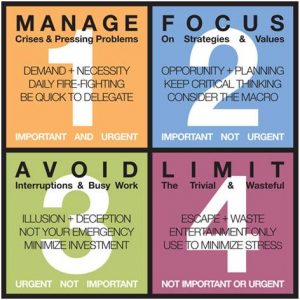Managing stress is something we all need to give attention to. In this article I’ll share with you one of the techniques which many people find useful for managing stress. It’s a technique that I often demonstrate at workshops, seminars and with my individual clients. It can be used by anyone at any time, and in fact I often use it myself to review my priorities when I’m feeling stressed. It helps me to adjust my thinking and change my actions so that I focus on the most important things in my life. I hope you find it useful too!

Life is a Bucket of Rocks
Life is like a bucket filled with rocks of all shapes, sizes, colours and weights. And just like that bucket, life can sometimes feel overloaded, lop-sided or empty. We notice our stress levels rising. When this happens, it can be helpful to have a look at what rocks you are carrying around in your bucket of life.
The Big Rocks
Think of the MOST IMPORTANT things in your life. Write them down in a list. It’s a very personal thing, so be sure to list whatever is most important to YOU. These things are the BIG ROCKS in your life. They are your priority. You need to make sure you have time, space and energy for them. For example, some of my big rocks are daily exercise and meditation, being home after school hours, home cooked food, mountain bike riding on weekends, getting to medical appointments, spending time connecting with family, spending time alone, and developing new and exciting work projects.
The Medium-Sized Rocks
Now it’s time to think of the other things in your life that are FAIRLY IMPORTANT to you, but not quite as important as the big rocks. They are special, but not as critical to your happiness and satisfaction in life as the big rocks. These are your MEDIUM-SIZED ROCKS. Write them down in a separate list. Some examples of my medium-sized rocks (at this point in time) are socialising with friends, housework, sewing, weekends away camping, completing training courses, and replacing the curtains in my office.
The Little Rocks
The LITTLE ROCKS, or pebbles, in your life are those things that have some significance, but they are NOT AS HIGH PRIORITY as the medium-sized or big rocks. They are the things that you can ‘give or take’ somewhat. It wouldn’t overly worry you if you put these things off to deal with another day. You like having them in your life, but when it comes to the crunch, they simply don’t rate as high in importance. Write your little rocks in a separate list. Some of my little rocks include going to evening meetings, going to concerts, and washing the car.
The Grains of Sand
The next list you create is of all the things that have LESS IMPORTANCE AND MEANING in your life, but they need some attention and time. There are usually lots and lots of these, and sometimes we get them mixed up with the bigger rocks without even realising! These are your GRAINS OF SAND. Some of my grains of sand include tidying the coffee table, doing the ironing, going to the post office, and selling my old tent.
Place Your Rocks in Your Bucket
Now it’s time to put your rocks into your bucket of life. It’s really important you do it in the right order because if you get it back-to-front you’ll end up with a lop-sided, top-heavy, or overflowing bucket. You’ll feel overwhelmed, stressed and pressured. You won’t have enough time and energy for the important things in your life, and you’ll find yourself racing around or stressing over the things that really don’t matter so much.
 So first of all, make sure you GET THE BIG ROCKS IN YOUR LIFE FIRST. They are your priorities so take steps to make sure you allow plenty of time and energy for them. Next put in your medium-sized rocks. Your small rocks go in after that and will be able to settle into the spaces between the bigger rocks. You can be more flexible with how they fit into your life. Next comes the sand. These things will be able to flow into the spaces that you have left. If there isn’t time and energy for them right now, that doesn’t matter. When things settle, they’ll have a place in your bucket once again.
So first of all, make sure you GET THE BIG ROCKS IN YOUR LIFE FIRST. They are your priorities so take steps to make sure you allow plenty of time and energy for them. Next put in your medium-sized rocks. Your small rocks go in after that and will be able to settle into the spaces between the bigger rocks. You can be more flexible with how they fit into your life. Next comes the sand. These things will be able to flow into the spaces that you have left. If there isn’t time and energy for them right now, that doesn’t matter. When things settle, they’ll have a place in your bucket once again.
Check Your Bucket Now and Again
You might even find that by doing this exercise there are things consuming your time and energy that you can let go of completely – some rocks that you choose not to put back into your bucket. Perhaps you found big rocks that are actually small rocks, or maybe you’ve discovered some small rocks that you’d like to become bigger rocks in your life. Have fun experimenting to see what works for you. And don’t forget that at any time you can dig down to see what you’re carrying around, and rearrange it so that the big rocks always go into your bucket of life first! It’s one of the most important actions you can take to manage your stresses effectively.
Take a Minute for Your Mind
 HAVE YOU SIGNED UP FOR MY FREE 7 DAY CHALLENGE “TAKE A MINUTE FOR YOUR MIND”? For more information and to register, go to the OFFERS tab on my website!
HAVE YOU SIGNED UP FOR MY FREE 7 DAY CHALLENGE “TAKE A MINUTE FOR YOUR MIND”? For more information and to register, go to the OFFERS tab on my website!
Discovering mountain biking as life’s ultimate parallel universe in her middle age,  Kathryn Walton shares information and reflections in Daisy Spoke that connect, inspire and self-empower women to make healthy choices for themselves. She integrates her love of physical exercise, family, nature, gardening and creative arts with her professional background in mental health social work to facilitate change with individuals, groups and communities of women who are committed to living life to the full.
Kathryn Walton shares information and reflections in Daisy Spoke that connect, inspire and self-empower women to make healthy choices for themselves. She integrates her love of physical exercise, family, nature, gardening and creative arts with her professional background in mental health social work to facilitate change with individuals, groups and communities of women who are committed to living life to the full.


